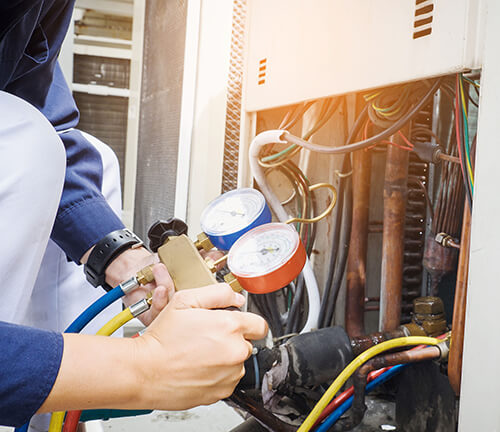Professional Maintenance Services by DMAKS HVAC For Your Needs.
Energy-Efficient Heating And Cooling Systems to Reduce Utility Costs
As power expenses continue to rise, the importance of energy-efficient a/c systems becomes significantly noticeable. These systems not just guarantee significant savings on energy bills however likewise contribute to a much more sustainable future by lessening energy intake. With different choices available, consisting of geothermal warm pumps and ductless mini-splits, residential property proprietors face a plethora of options that can improve convenience and air top quality. However, comprehending the essential features and upkeep demands is necessary to maximizing these benefits. What variables should be prioritized when picking the best system for your requirements?
Advantages of Energy-Efficient A/c Solutions
Energy-efficient HVAC systems supply many benefits that prolong past plain cost savings. By eating much less power, these systems contribute to reduce greenhouse gas emissions, aiding to battle climate change and advertise sustainability.
In addition, energy-efficient cooling and heating systems often give enhanced comfort degrees. Most of these systems feature sophisticated modern technology that permits for better temperature level control and improved air quality (DMAKS HVAC). This results in a healthier interior environment, which is particularly essential for individuals with allergic reactions or breathing issues
Additionally, buying energy-efficient cooling and heating systems can enhance home value. As even more customers focus on energy effectiveness, homes and buildings equipped with these systems might bring in greater bids in the genuine estate market.
Kinds Of Energy-Efficient Heating And Cooling Options
How can home owners and companies pick the most ideal energy-efficient cooling and heating choices for their demands? The marketplace uses a selection of energy-efficient cooling and heating systems, each designed to improve comfort while lessening power intake.
One option is the variable cooling agent flow (VRF) system, which efficiently controls the temperature level in several areas within a building. This system adapts its refrigerant flow to match the preferred temperature, bring about significant energy cost savings.
One more popular selection is geothermal heatpump, which utilize the earth's secure temperature to warmth and trendy rooms. By moving warmth to and from the ground, these systems demonstrate outstanding efficiency, especially in modest climates.
In addition, ductless mini-split systems provide an energy-efficient choice for homes doing not have ductwork. These systems enable zone-specific cooling and heating, reducing power waste in vacant locations.
Last but not least, high-efficiency heaters and air conditioning system, with sophisticated SEER and AFUE ratings, offer dependable climate control while eating much less power than standard models. By reviewing these alternatives, home owners and organizations can choose a cooling and heating system tailored to their details requirements and power efficiency goals.
Key Functions to Consider

Following, explore the kind of compressor made use of in the system. DMAKS HVAC. Variable-speed compressors can change their outcome to match the home heating or cooling need, resulting in enhanced comfort and power cost savings contrasted to single-speed models. Additionally, search for systems outfitted with smart thermostats that provide programmable settings and remote gain access to, enabling much better control over power usage
Another essential feature is the system's air filtering ability. High-efficiency filters can improve interior air quality and lower power consumption by ensuring the system operates efficiently. Additionally, take into consideration the kind of cooling agent used; contemporary systems often employ environment-friendly refrigerants that have a reduced environmental effect.
Last but not least, ensure that the system is compatible with zoning technology, which enables customized temperature control in various areas of your home, improving convenience while lessening energy usage.
Tips for Selecting the Right System


Following, take into consideration power performance ratings, especially the Seasonal Energy Efficiency Ratio (SEER) for cooling systems and the Annual Fuel Application Efficiency (AFUE) for furnace. Greater published here rankings indicate higher efficiency, which can lead to substantial savings on energy costs over time.
Furthermore, examine the type of a/c system that best matches your way of life and budget plan. Alternatives consist of air conditioning, ductless mini-splits, and heatpump, each with its very own set of benefits and downsides.
Don't forget the significance of appropriate installment and sizing; an inaccurately sized system can cause ineffectiveness and enhanced wear. Seek advice from with a specialist A/c professional to acquire experienced referrals customized to your home's special demands. This thorough technique will make certain that you select an energy-efficient a/c system that fulfills your needs and spending plan effectively.
Maintenance for Optimal Efficiency
Once the appropriate heating and cooling system is in area, continuous upkeep comes to be crucial to ensuring optimum efficiency and long life. A properly maintained system operates a lot more effectively, causing reduced energy usage and decreased visite site energy expenses. Routine inspections and tune-ups ought to be scheduled a minimum of twice a year-- as soon as before the air conditioning period and when prior to the home heating period.

House owners must also be vigilant concerning monitoring their HVAC system's performance. Uncommon noises, fluctuating temperatures, or raised power expenses can suggest underlying problems that need instant attention. By attending to these issues without delay, property owners can stop expensive repair work and expand the life expectancy of their systems.
Investing in an upkeep strategy with a certified service technician not just enhances efficiency however also gives tranquility of mind, knowing that the system is operating at its finest. DMAKS HVAC. Normal upkeep is therefore important for sustaining energy effectiveness and decreasing overall functional costs
Final Thought
In conclusion, energy-efficient cooling and heating systems offer a viable option for decreasing utility expenses while improving comfort and air top quality. By including check out here sophisticated innovations and options such as geothermal heatpump and ductless mini-splits, residential property proprietors can accomplish significant energy cost savings and add to environmental sustainability. Mindful consideration of system functions and recurring upkeep further ensures optimal efficiency, making energy-efficient systems a prudent investment for both financial and eco-friendly benefits.